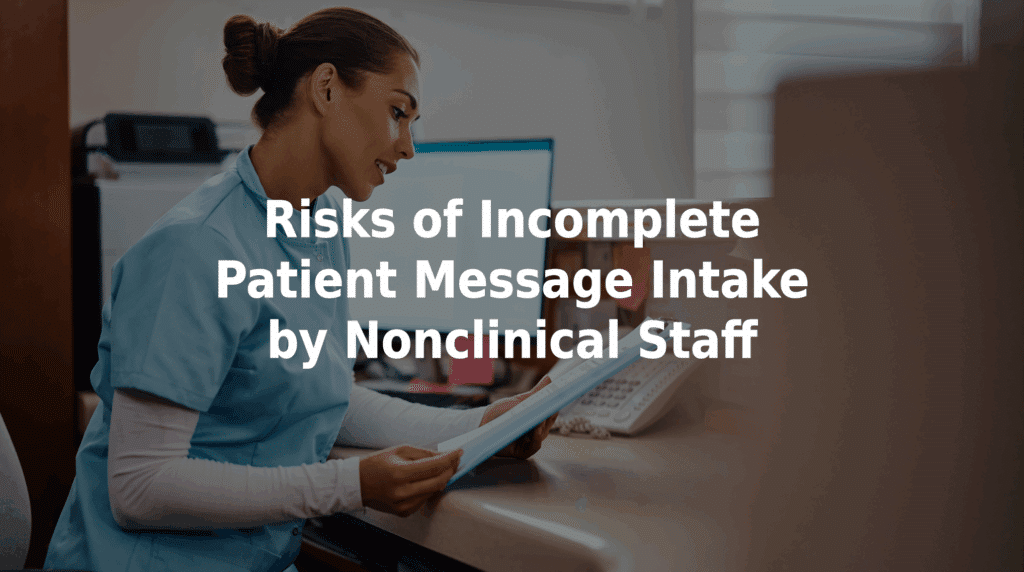Risks of Incomplete Patient Message Intake by Nonclinical Staff
One of the most overlooked but critical risks in healthcare call centers is the incomplete patient message intake by nonclinical staff. When key symptoms or concerns are missed, miscommunicated, or underprioritized, the impact on patient outcomes can be significant. Nurse managers, who are often responsible for coordinating clinical response and patient safety, must ensure that intake communication is both accurate and timely.
Why Message Intake Accuracy Matters
Accurate message intake is foundational to safe patient care. Nonclinical operators are often the first points of contact for patients calling with symptoms, medication concerns, or follow-up questions about their treatments, yet those operators are also not medically qualified to catch every potential piece of information. When key symptoms are glossed over or unclear, the clinical team may not have the details they need to respond appropriately.
Common Risks of Incomplete Intake
1. Misprioritized Urgency
A symptom like dizziness may be dismissed as minor unless accompanied by red flags like weakness or slurred speech — details that may not be collected during a basic intake.
2. Repeated Patient Follow-Ups
When messages are unclear, nurses must spend extra time following up with patients to clarify their symptoms or requests, delaying care and overloading already busy staff.
3. Missed Clinical Clues
Without standardized questions, staff may overlook important symptom combinations that could signal serious conditions like stroke, sepsis, or uncontrolled diabetes.
4. Patient Dissatisfaction
Patients expect efficient communication. When they’re asked to repeat information or experience delays, trust in the care team can decline.
5. Increased Liability Risk
Inaccurate or vague documentation can expose hospitals and providers to legal risks if patient harm results from a missed or delayed response.
Best Practices for Improving Intake Accuracy
- Standardize Symptom Intake
Provide guided prompts for common concerns like pain, breathing issues, or medication side effects. - Educate Nonclinical Operators
Offer training on what symptoms may require escalation — even without clinical interpretation. - Use Templates and Checklists
Encourage consistency by using structured fields for symptom details, time of onset, and patient concerns. - Leverage Technology for Intake Automation
Allow patients to self-report their symptoms on secure digital platforms with built-in clinical logic. - Collaborate Across Teams
Facilitate ongoing communication between operators, nurses, and providers to review message trends and improve workflows.
Example: When Vertigo Wasn’t Just Vertigo
In one instance, a 72-year-old woman called after hours to say that she had been experiencing vertigo, and requested a refill of her current medication. Without addressing any other potential symptoms, the operator passed the information along. A nurse manager happened to review the call and contacted the patient back — uncovering symptoms of headache and right-sided weakness. The patient was told to call 911 immediately to see if she had been affected by a stroke.
This example underscores the importance of capturing all relevant patient symptoms, even when their requests seem routine.
How Nurse Managers Can Lead the Way
Nurse Managers are uniquely positioned to bridge the gap between nonclinical operators and clinicians. By advocating for tools that support nonclinical staff and enhance intake accuracy, they protect both patients and their internal teams.
Streamline Intake With a Smarter Solution
TriageLogic’s MedMessage Automate is designed to solve these exact challenges. It allows patients to enter symptom information directly through a secure, mobile-friendly chatbot. Using clinically developed prompts, it ensures that every message is clear, complete, and routed to the appropriate team.
Key benefits include:
- AI-guided patient input.
- Reduced callbacks.
- Fewer documentation errors.
- Faster nurse response.
- Seamless EHR integration.
Ensure Every Patient Message Tells the Full Story
Don’t let incomplete intake compromise care. Contact us today to learn how MedMessage Automate supports safer, smarter communication.

